Deer are herbivorous animals. They eat a broad range of plants and plant-related items such as fruits, nuts, vegetables, twigs, and fungi. While they can eat all kinds of plants, not everything is good for them every time.
But do deer eat apples?
Wild and domestic deer will readily eat both fresh and rotten apples. Their ability to digest them, however, can be dependent on the season and whether or not the deer has acclimated to the fruit.

Even though apples are supplemental to them. Apples contain only some of the nutrients they need so they cannot survive by eating only apples.
Without a doubt, apples offer some benefits to deer. Mostly they are a yummy treat but deer have a digestive system that changes with diet and season. When feeding deer with apples and other fruits, you must be cautious.
Feeding them with apples in the wrong season and in the wrong quantities can pose a challenge for them. In fact, you could lead them to their death if you feed them apples the wrong way. The nutritional benefit of apples to deer, the best time for deer to eat apples, and much more are discussed below.
Table of Contents
Feeding Apples to Deer

There is usually no problem feeding apples to deer in spring and summer. During these seasons, the digestive tract of deer can tolerate apples. But things are different in winter.
Winter is usually a hard time for deer. Foods such as cereals, grasses, and leaves are not readily available to them. The ground is covered with thick layers of snow and finding food to eat becomes tough for them.
Also, the changes in vegetation that come with winter can contribute to the roughness deer experience. Trees and plants enter dormancy during winter as a way to survive the harsh conditions. They lose their leaves and slow down their metabolic processes.
The changes plants undergo in winter help the plants conserve energy for the period. But these changes are not too favorable to deer because the result in fewer foods available for them to eat.
Foods that are available are usually dried up and not as succulent as those in other seasons.
The main staples of a deers diet during winter includes lichens, barks, woody browse, and dried leaves. Although these set of foods are not the richest, deer adjust to surviving on them. Their digestive system also adjusts to digesting these types of foods.

These food are largely fibrous and would not add to the body mass of the deer. In fact, some deer may lose as much as 30% of their body weight. But before winter, many deer gain weight in preparation so the weight loss may not harm them.
Deer are accustomed to this harshness and will usually survive on the fibrous food. But some could die from starvation or from the harsh weather.
People try to feed wild deer with apples to help prevent them from starving. But doing this wrong way may do more harm than good to the deer. In winter, the deer digestive system will not readily digest apples.
If you feed them apples in large amounts, the apples will remain in their digestive tract for long without being digested. This sudden shift from a fibrous diet to a fermentable carbohydrate diet will alter the pH of the digestive tract leading to acidosis. Acidosis can cause dehydration, diarrhea, heart failure, and lung failure resulting in death.
This does not mean apples are outright bad for deer in winter. But if you will feed apples to deer in winter, you have to introduce it into their diet gradually. You have to feed them in small quantities until their digestive system adapts to it. It could take up to 3 weeks for their digestive microorganisms to adapt to a new diet.
Nutritional Benefits of Apple

Deer love apples and would eat them whether fresh or rotten. With the nutritional benefits of apple to deer, you cannot fault their love for it. Apples have high levels of water, carbohydrate, vitamins, and minerals but low levels of fiber, fat, and protein.
Apples are not good enough as standalone food for deer but the vitamins and minerals they hold are very useful. The following are the benefits of the vitamins & minerals in apple:
- Antioxidants – apples are very rich in antioxidants. They contain vitamin C, catechin, quercetin, chlorogenic acid, which are all antioxidants. These compounds protect the cells of the deer from getting damaged by reactive oxygen species. They also help reduce oxidative stress on the deer and improve the function of the immune system. The net effect of antioxidants on deer is better health.
- Potassium – potassium is the main mineral found in apple. It is essential for fluid balance in deer. It is also essential for heart function, nerve function, and muscle contraction.
- Carbohydrate – carbohydrate is the main nutrient in apples. It is present as simple sugars such as fructose, glucose, and sucrose. These sugars serve as the primary source of energy for the deer.
- Fiber – apple also contains pectin fibers. These fibers improve the gut health of the deer. They promote the growth of digestive bacteria in the rumen of deer.
- Protein and Fat – apples also contain protein and fat. But they usually make up less than 1% of the nutritional content of apples.
Other Fruits Deer Enjoy

Apple may be a favorite for deer but they are not the only ones they enjoy. Apart from apples, deer also enjoy the following fruits:
- Blueberries
- Blackberries
- Watermelons
- Persimmons
- Bananas
- Oranges
- Tomatoes
- Grapes
- Pears
- Cherries
Although apples are safe for deer to eat, there is one very important factor to consider. This factor is the season. Deer can eat apples safely in spring and summer but in winter, their digestive system will not readily digest apples.
Resources
- https://www.healthline.com/nutrition/foods/apples#nutrients
- https://bangordailynews.com/2012/02/22/outdoors/outdoors-extra/proper-supplemental-diet-can-benefit-deer-during-winter/
- https://www.bonecollector.com/the-dos-and-donts-of-feeding-deer-this-winter/
- https://www.deeranddeerhunting.com/deer-scouting/deer-behavior/food-facts-secrets-whitetails-stomach
- http://www.deerfriendly.com/feeding-deer
- https://www.outdoorlife.com/blogs/big-buck-zone/2013/02/are-you-feeding-your-deer-death/
- https://www.hunterhunts.com/do-deer-eat-fruits/#Do_Deer_Eat_Apples
- https://www.wikihow.com/Feed-Deer

